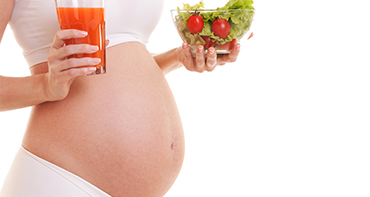
This article was published on: 04/6/17 7:38 AM
A well-balanced diet means eating the right amount of nutrients to supply the body with the energy it needs to function properly. It also means getting the right amount of nutrition to support growth and development. A well-balanced diet contains nutrient-rich foods from all the food groups.
Pregnancy is a demanding physiological state. Additional foods are required to improve weight gain in pregnancy (10-12 Kg) and birth weight of infants (about 3 Kg). It is hence important to ensure provision of extra food and healthcare to pregnant and lactating women.
Nutrition tips for pregnant and lactating women:
1) Eat more food during pregnancy
2) Eat more whole grains, sprouted grams and fermented foods
3) Take milk/meat/eggs in adequate amounts
4) Eat plenty of vegetables and fruits
5) Avoid superstitions and food taboos
6) Do not use alcohol and tobacco. Take medicines only when prescribed
7) Take iron, foliate and calcium supplements regularly, after 14-16 weeks of pregnancy and continue the same during lactation
Ways to meet the nutritional demands during pregnancy and lactation:
The pregnant/lactating woman should eat a wide variety of foods to make sure that the nutritional needs of both the mother and foetus are met. Cooking oil is a concentrated source of both energy and polyunsaturated fatty acids. Good quality protein is derived from milk, fish, meat, poultry and eggs.
However, a proper combination of cereals, pulses and nuts should also be included in the diet as they provide the required amount of proteins. Mineral and vitamin are found in green leafy vegetables, milk and fresh fruits. Bioavailability of iron can be improved by using fermented and sprouted grams and foods rich in vitamin C such as citrus fruits. Milk is the best source of biologically available calcium. Apart from these, daily supplements of iron, folic acid, vitamin B and calcium must be taken.
Importance of eating Foliate-Rich Foods:
1) Folic acid is essential for the synthesis of hemoglobin
2) Folic acid deficiency leads to macrocytic anemia
3) Pregnant women need more of folic acid
4) Folic acid supplements increase birth weight and reduce congenital anomalies
5) Green leafy vegetables, legumes, nuts and liver are good sources of folic acid
6) 500 mg (0.5mg) folic acid supplementation is advised pre-conceptionally and throughout pregnancy for women with history of congenital anomalies (neural tube defects, cleft palate)
Importance of eating Iron-Rich Foods:
1) Iron is needed for hemoglobin synthesis, mental function and to provide immunity against diseases.
2) Deficiency of iron leads to anemia.
3) Iron deficiency is common particularly in women of reproductive age and children.
4) Iron deficiency during pregnancy increases maternal mortality and low birth weight infants.
5) In children, it increases susceptibility to infection and impairs learning ability.
6) Plant foods like green leafy vegetables, legumes and dry fruits contain iron.
7) Iron is also obtained through meat, fish and poultry products.
8) Iron bio-availability is poor from plant foods but is good from animal foods.
9) Vitamin C rich fruits like gooseberries (Amla), guava and citrus improve iron absorption from plant foods.
10) Beverages like tea bind dietary iron and make it unavailable. Hence, they should be avoided before during or soon after a meal.
11) Commonly consumed plant based diets provide around 18mg of iron as against recommended intake of 35mg per day. Therefore, supplementation of iron (100 mg elemental iron, 0.5 mg folic acid) is recommended for 100 days during pregnancy from 16th week onwards to meet the demands of pregnancy.